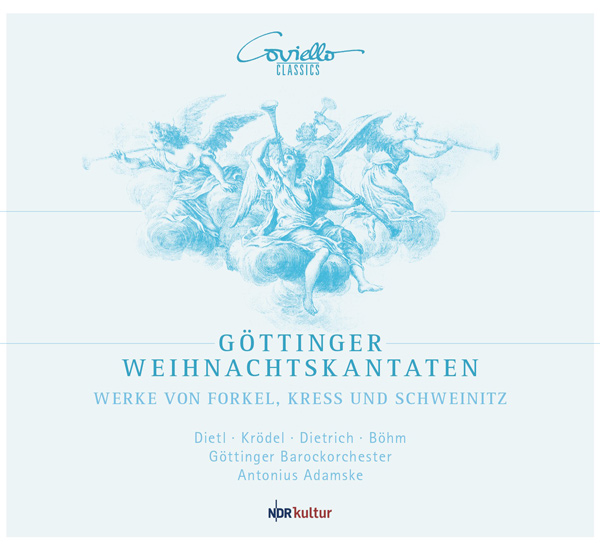Göttinger Barockorchester
Antonius Adamske ⋅ direction
Antonius Adamske ⋅ direction

Edition: Coviello Classics
Booklet: de / en
Media: 2 CDs
KERSTIN DIETL
soprano
JOHANNA KRÖDEL
alto
MAGNUS DIETRICH
tenor
HENRYK BÖHM
bass
HANS-HENNING VATER
concertmaster
CHRISTIANE GAGELMANN
violin
LEA STRECKER
viola
KONSTANZE WAIDOSCH
cello
LAURA FREY
violon
CHRISTOF PANNES
organ
DOROTHEE KUNST, BRIAN BERRYMAN
flutes
MARTIN JELEV, SIMON BÖCKENHOFF
oboes
LISA SHKLYAVER, ODILO ETTELT
clarinets
RHODA PATRICK
bassoon
STEPHAN KATTE, URSULA DUMMER
horns
RUPPRECHT JOHS. DREES, HELEN BARSBY
trumpets
DANIEL SCHÄBE
timpani
ANTONIUS ADAMSKE
direction
Fertilising
The city of Göttingen is a good example of how science and the arts can stimulate each other: With the founding of the university there in 1734, a golden age dawned in the cultivation of music, with Johann Friedrich Schweinitz (1708-1780) being one of the protagonists. The Christmas Cantata is one of his greatest works, and the influence of Bach as a role model can be felt in it. Schweinitz’s successors broadened the stylistic spectrum, and so, supplemented by symphonic works, a colourful picture of Göttingen’s musical life on the threshold from the Baroque to the Classical era emerges here.
| CD 1 GEORG PHILIPP KRESS (1719 – 1779) OUVERTÜRE D-DUR |
|||
| 1. | I | Un poco grave e staccato | 4:50 |
| 2. | II | Andante | 4:37 |
| 3. | III | Allegro | 4:14 |
| JOHANN FRIEDRICH SCHWEINITZ (1708 – 1780) JAUCHZET IHR VÖLKER · JFS-WV 1 |
|||
| 4. | I | Chor: Jauchzet ihr Völker | 3:40 |
| 5. | II | Rezitativ: Wo ist der Herr, der König aller Ehren? | 1:20 |
| 6. | III | Arie: Ich kehr nach Bethlehem zurück | 3:30 |
| 7. | IV | Rezitativ: Nun ist die frohe Zeit erfüllt | 0:36 |
| 8. | V | Choral: Willkommen, oh du edler Gast | 0:43 |
| CARL FRIEDRICH RUDORFF (1749 – 1796) SINGET DEM HERRN EIN NEUES LIED · CFR-WV 0 |
|||
| 9. | I | Chor: Singet dem Herrn ein neues Lied | 4:18 |
| 10. | II | Arie: Gott, der die Welt der Sünder liebt | 1:12 |
| 11. | III | Chor: Also hat Gott die Welt geliebt | 1:57 |
| ERWACHET ZUR FREUDE DER STERBLICHEN CHÖRE · CFR-WV 1 | |||
| 12. | I | Arie: Erwachet zur Freude der Sterblichen Chöre | 2:12 |
| 13. | II | Chor und Solo: Wir jauchzen voll Freude dir König der Ehren | 3:35 |
| BERNHARD CHRISTOPH KÜMMEL (1756 – 1836) ERHEBET DEN HERRN |
|||
| 14. | I | Chor: Erhebet den Herrn | 2:51 |
| 15. | II | Arioso: Seiner Güte holde Spur | 1:30 |
| 16. | III | Chor: Und vor seines Zornes Schelten | 2:49 |
| Total time CD 1: | 44:04 | ||
| CD 2 JOHANN NIKOLAUS FORKEL (1749 – 1818) SINFONIA ES-DUR · FoWV 129 |
|||
| 1. | I | Allegro di molto | 7:21 |
| 2. | II | Andantino | 3:15 |
| 3. | III | Allegro assai | 6:02 |
| DIE HIRTEN BEY DER KRIPPE ZU BETHLEHEM · FoWV 103 | |||
| 4. | I | Rezitativ: Hier schläft es, o wie süß | 2:40 |
| 5. | II | Arie: Hirten aus den goldnen Zeiten | 10:52 |
| 6. | III | Rezitativ: Der Löwe wiegt in seinen Klauen das kleine Lamm | 1:21 |
| 7. | IV | Duett: Friede wieder holder Friede! | 4:44 |
| 8. | V | Rezitativ: Die Pestilenz darf ferner nicht | 1:12 |
| 9. | VI | Arie: Schönstes Kind, aus Juda Saamen | 8:45 |
| 10. | VII | Rezitativ: Ach seht! Das Kind erwacht | 2:19 |
| 11. | VIII | Chor: Ehre, Ehre, Ehre sey Gott in der Höhe! | 4:59 |
| Total time CD 2: | 53:38 | ||
| Gesamtspielzeit CD 1 + CD 2: | 1:37:42 | ||